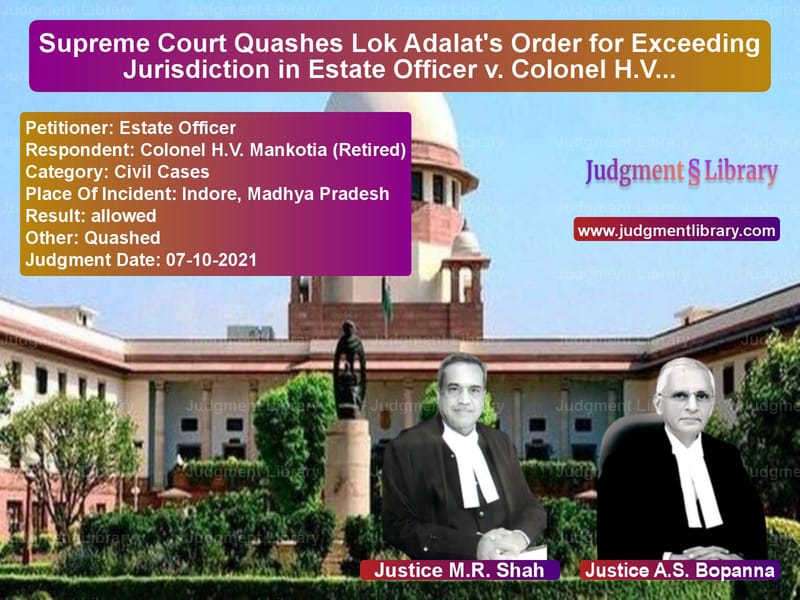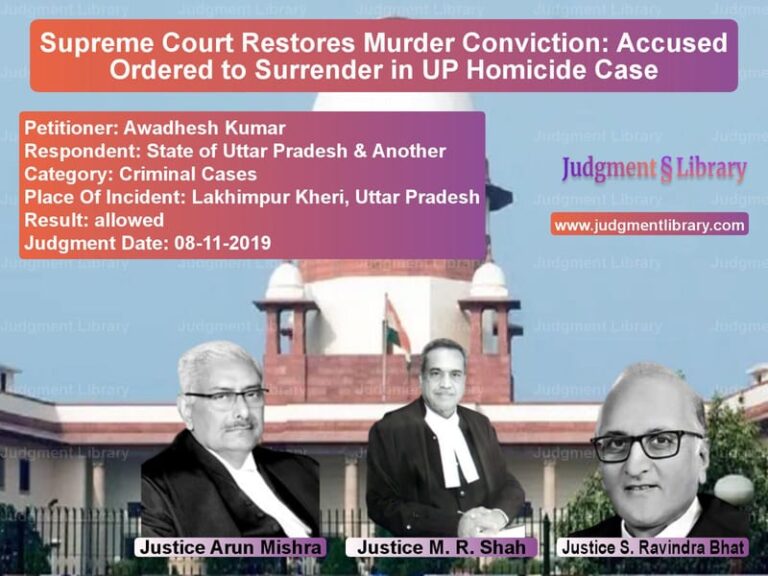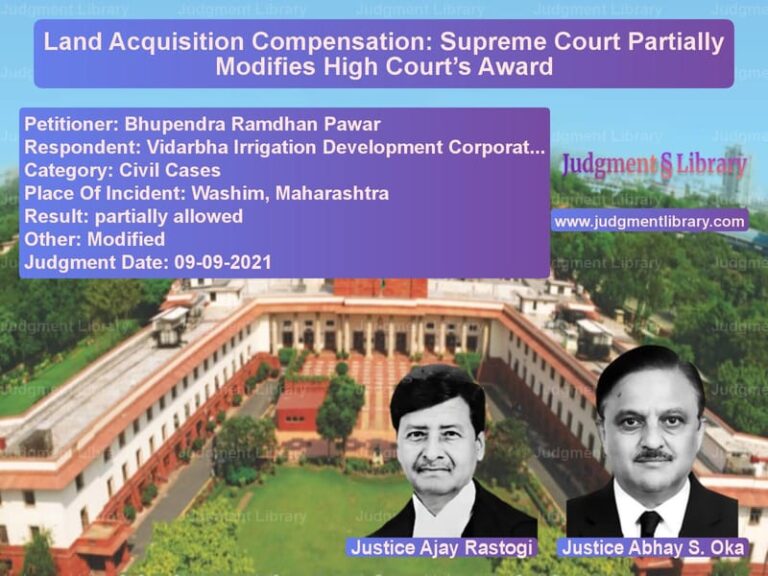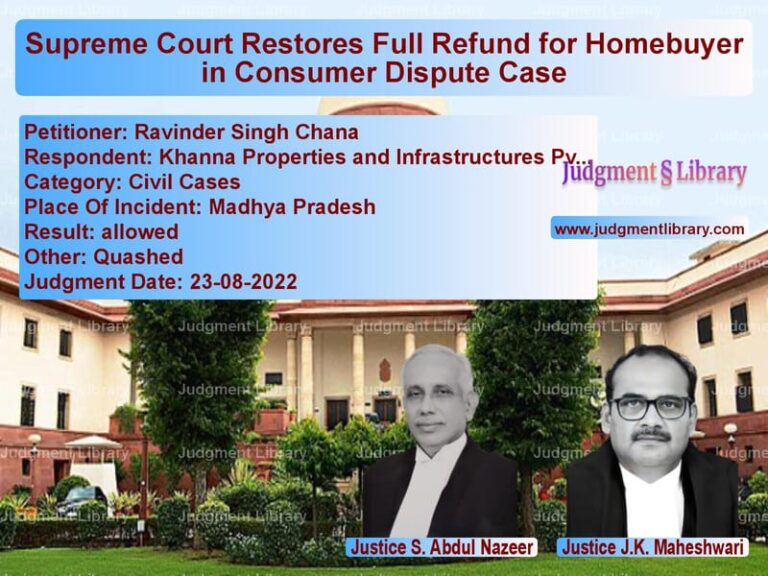Supreme Court Quashes Lok Adalat’s Order for Exceeding Jurisdiction in Estate Officer v. Colonel H.V. Mankotia
The Supreme Court of India recently delivered an important judgment in the case of Estate Officer v. Colonel H.V. Mankotia (Retired), where it held that Lok Adalats cannot decide cases on merits and can only facilitate settlements. The ruling reaffirmed the fundamental principle that Lok Adalats operate under the Legal Services Authorities Act, 1987 and lack the jurisdiction to adjudicate disputes where no compromise is reached. The judgment set aside an order passed by a Lok Adalat that dismissed a writ petition on merits, directing the High Court to restore the matter for proper adjudication.
Background of the Case
The appellant in this case was the Estate Officer responsible for managing public premises, while the respondent, Colonel H.V. Mankotia (Retired), was the occupant of a government-owned property. The dispute arose from eviction proceedings initiated by the appellant against the respondent for unauthorized occupation of public premises.
The appellant had originally approached the High Court of Madhya Pradesh, challenging certain decisions related to the eviction order. The High Court, in an attempt to facilitate an amicable settlement, referred the case to the Lok Adalat. However, instead of attempting to mediate and secure a compromise between the parties, the Lok Adalat proceeded to hear and dismiss the writ petition on merits, acting beyond its jurisdiction.
Aggrieved by the Lok Adalat’s order, the Estate Officer filed an application for restoration of the writ petition, arguing that the Lok Adalat had exceeded its statutory powers. However, the High Court rejected the restoration application, leading the appellant to approach the Supreme Court.
Legal Issues Considered
- Whether the Lok Adalat had the jurisdiction to decide the writ petition on merits.
- Whether the High Court was justified in rejecting the appellant’s restoration application.
- The scope of Sections 19(5) and 20(3) of the Legal Services Authorities Act, 1987, which define the powers of Lok Adalats.
- The consequences of allowing Lok Adalats to exceed their jurisdiction in disposing of cases.
Petitioner’s (Estate Officer) Arguments
The appellant, represented by the government’s legal counsel, contended that:
- The Lok Adalat lacks the jurisdiction to decide matters on merits. Its role is restricted to facilitating settlements or compromises between parties.
- Under the Legal Services Authorities Act, 1987, if no settlement is reached, the matter must be returned to the referring court for adjudication.
- The Lok Adalat’s dismissal of the writ petition was legally invalid and amounted to judicial overreach.
- The High Court erred in rejecting the restoration application since the matter had never been properly adjudicated.
Respondent’s (Colonel H.V. Mankotia) Arguments
The respondent, on the other hand, argued that:
- The appellant had consented to the matter being heard by the Lok Adalat.
- Once a case is referred to Lok Adalat, parties must abide by its decision, even if it rules on the merits of the case.
- The Lok Adalat’s decision was final and binding, and the appellant could not seek restoration merely because the ruling was unfavorable.
- The High Court was correct in rejecting the restoration application since the appellant had voluntarily agreed to the Lok Adalat proceedings.
Supreme Court’s Observations
On Lok Adalat’s Jurisdiction
The Supreme Court firmly ruled that Lok Adalats do not have the power to decide cases on merits:
“A Lok Adalat shall have jurisdiction to determine and to arrive at a compromise or settlement between the parties to a dispute. If no compromise is reached, the matter must be returned to the referring court.”
The Court referred to Section 19(5) and Section 20(3) of the Legal Services Authorities Act, 1987, which explicitly limit Lok Adalats’ powers to conciliation and settlement, not adjudication.
On the High Court’s Error
The Supreme Court found that the High Court had committed an error in dismissing the appellant’s restoration application:
“The High Court should have restored the writ petition for adjudication on merits instead of dismissing it outright. The Lok Adalat’s order was without jurisdiction.”
On the Consent Argument
The Supreme Court rejected the respondent’s contention that the appellant had agreed to Lok Adalat’s jurisdiction:
“Consent to refer a matter to Lok Adalat does not mean consent for it to be decided on merits. The Lok Adalat’s role is strictly limited to facilitating a settlement.”
Final Judgment
The Supreme Court ruled:
- The Lok Adalat’s order was quashed as it exceeded its jurisdiction.
- The High Court was directed to restore and decide the writ petition on merits.
- The case was remanded to the High Court for fresh adjudication.
- The appellant was entitled to have the matter heard properly in a competent judicial forum.
Significance of the Judgment
- Clarifies Lok Adalat’s Powers: Reaffirms that Lok Adalats can only facilitate settlements and cannot decide cases on merits.
- Prevents Misuse of Lok Adalats: Ensures that Lok Adalat proceedings remain within their legal mandate.
- Protects the Right to Judicial Review: Confirms that High Courts cannot dismiss writ petitions based on Lok Adalat proceedings.
- Upholds Procedural Fairness: Ensures that cases are properly heard and decided by courts with the appropriate jurisdiction.
Conclusion
The Supreme Court’s ruling in Estate Officer v. Colonel H.V. Mankotia is a landmark decision that upholds the limits of Lok Adalat’s jurisdiction. By quashing the Lok Adalat’s order, the Court has reinforced that disputes must be adjudicated properly in competent courts when no settlement is reached. This ruling serves as a crucial precedent to prevent judicial overreach by alternative dispute resolution forums and safeguards the fundamental rights of litigants seeking judicial review.
Petitioner Name: Estate Officer.Respondent Name: Colonel H.V. Mankotia (Retired).Judgment By: Justice M.R. Shah, Justice A.S. Bopanna.Place Of Incident: Indore, Madhya Pradesh.Judgment Date: 07-10-2021.
Don’t miss out on the full details! Download the complete judgment in PDF format below and gain valuable insights instantly!
Download Judgment: estate-officer-vs-colonel-h.v.-mankoti-supreme-court-of-india-judgment-dated-07-10-2021.pdf
Directly Download Judgment: Directly download this Judgment
See all petitions in Legal Malpractice
See all petitions in Contempt Of Court cases
See all petitions in Public Interest Litigation
See all petitions in Judgment by Mukeshkumar Rasikbhai Shah
See all petitions in Judgment by A. S. Bopanna
See all petitions in allowed
See all petitions in Quashed
See all petitions in supreme court of India judgments October 2021
See all petitions in 2021 judgments
See all posts in Civil Cases Category
See all allowed petitions in Civil Cases Category
See all Dismissed petitions in Civil Cases Category
See all partially allowed petitions in Civil Cases Category







